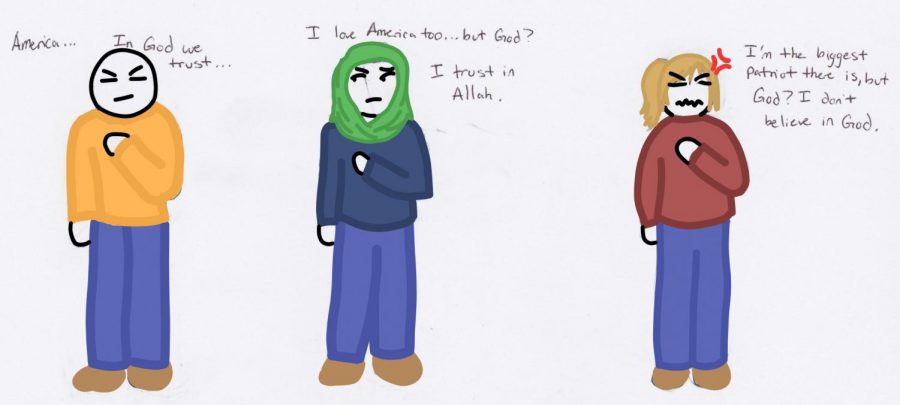One nation but not one God
LB36 crosses the line with the intertwining of church and state
Feb 28, 2021
A new legislative bill was introduced in Nebraska in January of this year by Sen. Erdman that would require public schools to display the United States national motto ‘In God We Trust’ in every classroom. Schools would be required to display the motto clearly, and in legible English in each classroom, or in a place where each student would be able to visibly see and read it every day. If schools were to refuse, or to not follow through with this if this bill were enacted, the Attorney General would be enabled to intervene.
Requiring this signage seems to be a violation of the separation between church and state. This separation of church and state has existed in American politics since the beginning, in which the Founding Fathers began their attempt at creating a safe foundation for the future that didn’t necessarily create room for a theocracy. Although many Americans today identify as Christians and most, if not almost all, identified as Christians during the late 18th century, it’s still quite insensitive to assume that those who aren’t Christians are not powerful or important. Acknowledging some statistics in Nebraska, and according to the Pew Research Center, the majority of the Nebraska population is Christian, with a 75 percent majority, but the other 25 percent isn’t insignificant. Thousands of people in the state of Nebraska are not Christian, and they deserve the same respect as the majority, as do their children who would be especially affected by this.
Religious language exists in many important American songs and sayings, such as the national motto or the Pledge of Allegiance which has been required in public schools since the early 20th century, but the phrase “under God” was not added until June 14, 1954. Implemented by President Eisenhower, the phrase “under God” was created by Rev. George Docherty, who argued that, “To omit the words ‘under God’ in the Pledge of Allegiance is to omit the definitive factor in the American way of life.” he was quoted in The Washington Post in their article ‘The gripping sermon that got ‘under God’ added to the Pledge of Allegiance on Flag Day by Rachel Siegel, in which they explain the creation of the Pledge and Flag Day. The choice to add “under God” has been somewhat controversial in the past decade since he not only directly leaves out American atheists, but also directly claims that “If you deny the Christian ethic, you fall short of the American ideal of life.” which bluntly states his intent of expressing America as a Christian nation rather than the very mixed state that it is.
Maybe rather than displaying the national motto, which seems problematic, it would actually be beneficial to change the motto and maybe even other American symbols such as the Pledge. Progress in American society is something that we should strive for, and although we should always be able to look to the past for guidance, we should also look to the future, and that includes being more inclusive.

